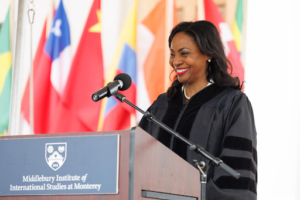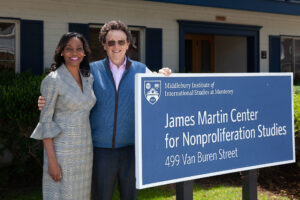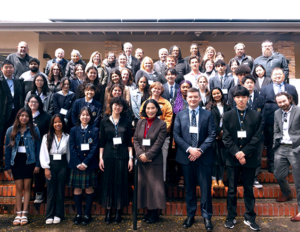May 29, 2024
by Linus Hoeller and Ian Driscoll

Shorna-Kay Richards, Jamaica’s ambassador to Japan received an honorary doctorate degree in recognition of her work as a diplomat and disarmament advocate. (Credit: Rob Ellis )
Spreading a message of urgency to address a myriad of global problems but also one of hope, Jamaican ambassador to Japan Shorna-Kay Richards addressed the Middlebury Institute’s graduating class during last weekend’s commencement. Speaking of her experiences as a female diplomat at the UN from an often-overlooked island nation, she said she had great hopes and expectations for the graduating class of 2024.
“Efforts to drive change are at once a marathon and a relay,” she said, and stressed that multinational cooperation is essential to making the world a better place. She noted that MIIS’ graduating class counted students from 20 different countries, making for a truly multicultural setting.
Richards emphasized the vital role that the Center for Nonproliferation Studies and its initiatives, including the Critical Issues Forum, play in giving future policymakers the tools to build a better world. The Critical Issues Forum run by CNS’ Senior Project Manager and Research Associate, Masako Toki, seeks to promote disarmament and nonproliferation education in high school students from around the world.
When asked about Ms. Masako Toki’s important role at CNS, Ambassador Richards wrote that Masako Toki “is fiercely committed to disarmament education and youth empowerment. For me her belief in the power and agency of young people is unmatched.”
The ambassador shared with the students, families and faculty the three guiding principles that she said help guide her through her life as a career diplomat working on everything from environmental protection to the abolition of nuclear weapons: Taking responsibility, using one’s agency and embracing cross-cultural cooperation.
In a world with an “over-reliance on military solutions,” collaboration is an important value that found repetition throughout Richards’ speech. Her generation had been careless, she said, highlighting problems ranging from climate change to the erosion of international norms and the lack of trust in institutions. But in the audience – the up-and-coming leaders and decision-makers – she said she saw a glimmer of hope.

Jamaican ambassador to Japan Shorna-Kay Richards and CNS Founding Director William Potter. Dr. Potter firmly believes in the importance of providing young people with role models whom they can emulate in the early stages of their career.
Dr. Potter, a friend and great admirer of Ambassador Richards, observed that one can’t overemphasize the importance of providing young people with role models whom they can emulate in the early stages of their career. Ambassador Richards is such a role model extraordinaire, and her speech managed to be uplifting at the same time that it conveyed the need for concerted action.
Ambassador Richards noted Dr. Potter’s significant impact on her and so many other global leaders’ commitment to nonproliferation. Ambassador Richards wrote, “it was my good fortune to meet Dr William Potter, world renowned guru in the field of disarmament and non-proliferation, in May 2016 at the third session of the Open-ended Working Group on Taking Forward Multilateral Nuclear Disarmament Negotiations in Geneva. And since our meeting he has not faltered in his efforts to ensure that I remain in the field of disarmament and nonproliferation even though my tenure at the Jamaican Permanent Mission to the UN ended in July 2016.”
Ambassador Richards, who currently serves as the chair of the UN Secretary-General’s advisory board on disarmament matters, ended on a – quite literal – note of unity, singing the chorus to Bob Marley’s famous reggae song “One Love” together with the graduating class: “Let’s join together and I’ll feel all right.”

